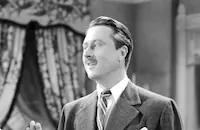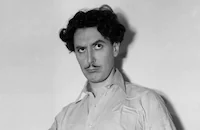Immortal Sergeant

Brief Synopsis
Cast & Crew
John M. Stahl
Henry Fonda
Maureen O'hara
Thomas Mitchell
Allyn Joslyn
Reginald Gardiner
Film Details
Technical Specs

Synopsis
While shy Canadian journalist Colin Spence is living in London, he joins the British Army and is stationed in Libya. There he serves under Sergeant Kelly, a longtime military man who is greatly admired by his men. Although Kelly takes an interest in Spence and tries to build up his ego, Spence remains unassertive. One afternoon, Spence remembers a time before the war, when he went with his girl friend, Valentine Lee, to a party at which they met war correspondent Tom Benedict. Benedict was a self-assured blowhard who easily impressed Valentine, and Spence soon regreted introducing them. Back in the desert, Kelly and Spence lead a reconnaisance patrol of fourteen men into the brutal heat. As they are traveling, Spence again remembers Valentine, who was further won over by Benedict when he impressed her on her birthday. Spence's mind returns to the present when the patrol stops for lunch, but before they resume their journey, they are attacked by Italian airplanes. During the ensuing skirmish, Spence and his men shoot down one of the planes, but it crashes on one of the patrol's trucks, killing eight men. With only Spence, Symes, Pilcher, Cottrell and Cassidy and himself left, Kelly moves the men onward, but that night, admits to Spence that they are lost. Spence is frightened when Kelly says that he must assume command if anything happens to him, but Kelly admonishes him to get the patrol home safely. The next day, a passing British plane warns them that an Italian armored car is ahead. Hoping to use the car for transportation, Kelly leads the men to it, but his plans go awry when Symes's gun goes off accidentally, and the enemy is alerted to their presence. Symes is killed during the exchange of gunfire, and Kelly is seriously wounded. Spence gets the sergeant to cover, where he refuses to listen to Kelly's orders to leave him behind for the good of the group. While Spence is discussing the situation with the remaining three men, Kelly shoots himself, and the soldiers bury their brave sergeant. Spence then assumes leadership of the patrol and drives the men hard, as Kelly had instructed him. While they are walking, Spence's mind drifts back to Valentine, who spent his first leave with him and encouraged him to be more assertive romantically. Spence's reverie ends when the group finds an oasis, which is held by German soldiers. While Spence waits for dark, he remembers the last time he saw Valentine, when it appeared that Benedict had completely won her affections. As darkness falls in the desert, Spence crawls into the oasis and hears Kelly's voice urging him on. Spence steals food and water, then dismantles the Germans' radio equipment before returning to his men. There, Spence tells them that they must try to take the German stronghold, explaining that it is the cumulative effect of every single man fighting in every position that will win the war. Using Spence's strategy, the men split up and engage the enemy during a sandstorm. Spence is with Cottrell and fights hard until an explosion knocks him out. Later, Spence awakens in a Cairo hospital, where Cottrell tells him that he was wounded when Cottrell threw a grenade in the enemy munitions dump. The action was successful, although Cassidy was killed. Pilcher is recovering in the same hospital, and both Cottrell and Spence have been awarded distinguished conduct medals. Spence is trying to assimilate the information when Benedict arrives and is his usual sarcastic self. Suddenly aware of his own strength, and no longer afraid, Spence orders Benedict to send Valentine a telegram saying that he wants to marry her. Benedict protests, but Spence intimidates him and sends him on his way. Soon after, Spence, who has been promoted to lieutenant, meets Valentine at a London railway station. There, Spence once again hears Kelly's encouraging words as he embraces Valentine.

Director

John M. Stahl
Cast

Henry Fonda

Maureen O'hara

Thomas Mitchell

Allyn Joslyn

Reginald Gardiner

Melville Cooper

Bramwell Fletcher
Morton Lowry
David Thursby
Guy Kingsford
Bud Geary

Peter Lawford
Gordon Clark
John Whitney
John Meredith
Robert Herrick
Hans Von Morhart
Henry Guttman
Frederick Giermann
Bob Mascagno
Italia Denubila
Donald Stuart
Leslie Vincent
Anthony Marsh
Eric Wilton
Wilson Benge

Charles Irwin
James Craven
Jean Prescott
John Banner
Sam Waagenaar
Crew
Arthur Appell
James Basevi
Joe Behm
Captain Bartle Bull
David Buttolph
James B. Clark
Richard Day
Clyde De Vinna
W. F. Fitzgerald
W. D. Flick
William Goetz
Roger Heman
Thomas Little
Earl Luick
Arthur Miller
Alfred Newman
Guy Pearce
Maurice Ransford
Fred J. Rode
Ad Schaumer
James Tinling
Lamar Trotti
Lamar Trotti
Robert Webb

Film Details
Technical Specs

Articles
Immortal Sergeant
The next day he was sent to boot camp in San Diego -- where he was immediately detained by the Shore Patrol and returned to Hollywood! Fox studio chief Darryl Zanuck had used his influence to get Fonda a deferment so that he could cast him in a new movie, Immortal Sergeant (1943), which Zanuck claimed would help the war effort. Fonda later recalled bitterly: "So there I was back in Imperial Valley, California, in the hottest part of the desert, making a film called Immortal Sergeant. It was a silly picture. You want to hear the plot? I won World War II single-handed!"
This treatment by Zanuck left a bad taste in Fonda's mouth for the film, for Zanuck, and for 20th Century-Fox. For the rest of his life, Fonda routinely cited Immortal Sergeant as his least favorite movie. But judged on its own terms decades later, that appraisal seems overly harsh. Immortal Sergeant is hardly the greatest WWII movie, but it's not bad at all. Based on a bestselling novel by John Brophy, whose name appears above the title, the film is about a timid Canadian corporal (Fonda) serving in a British unit in Libya. He's taught a thing or two about courage and leadership by his beloved patrol sergeant (Thomas Mitchell) before the latter is killed. Fonda then must take command of what's left of the unit and complete their mission. (This was the first major Hollywood film to depict the British campaign in Africa.)
There's another story being told here, that of Fonda's romance with a girl back home -- lovely Maureen O'Hara, who at one point is seen emerging dripping wet from a shimmering lake. Through flashbacks, Fonda remembers his shyness in pursuing her, even as a rival (Reginald Gardner) romances her aggressively. For Fonda, tentativeness in love is connected to tentativeness in war. In the end, both must be resolved, and since this is a propagandistic war movie made during the war, it's no surprise how things turn out. (The flashbacks also allow Immortal Sergeant to become, in film scholar Jeanine Basinger's words, "the only combat film with a Cuban musical number!")
Reviews were mixed. Variety praised the "neatly-woven script" and "excellent photography," and said John M. Stahl "directs in deft style. Desert warfare is vividly displayed." The trade paper also gave Fonda good marks and noted "two spectacular sequences" -- one in which a plane crashes into a truck, and another in which the patrol launches an attack on the German encampment during a sandstorm. The New York Times found the film disappointing and "trivial," relying too much on cliché, but even here Fonda's performance was praised.
Maureen O'Hara later remembered Fonda preparing for his war duties while on location: "I can still see Hank with his nose buried in books between takes, studying for his service entrance exams. The studio publicized our love scene as Hank's last screen kiss before going to war."
The day after Fonda finished with Immortal Sergeant, he returned to duty in the navy. He went on to work in naval intelligence, saw action in the Pacific, and was awarded a Presidential citation and the Bronze Star.
Immortal Sergeant would be released to theaters before The Ox-Bow Incident both because the former was seen as more important to get out as soon as possible, and because Zanuck personally hated the latter and had no idea how to market it. He ended up barely giving The Ox-Bow Incident a release at all, and then using its small box-office numbers to justify his low opinion of the film. But The Ox-Bow Incident has gone on to become a classic, one of Fonda's most respected movies, while Immortal Sergeant has basically become forgotten -- to the point of being underrated.
By Jeremy Arnold
SOURCES:
Jeanine Basinger, The World War II Combat Film: Anatomy of a Genre
Devin McKinney, The Man Who Saw a Ghost: The Life and Work of Henry Fonda
Maureen O'Hara with John Nicoletti, 'Tis Herself
Howard Teichmann (as told to), Fonda: My Life
Tony Thomas, The Films of Henry Fonda

Immortal Sergeant
Quotes
Trivia
Notes
The film's opening title card reads "Twentieth Century-Fox presents Henry Fonda and Maureen O'Hara in John Brophy's Immortal Sergeant." Lamar Trotti's onscreen credit reads "Produced and written for the screen by Lamar Trotti." Hollywood Reporter news items reveal the following about the production: Studio production chief Darryl F. Zanuck was scheduled to produce the picture personally, but could not due to active military duty. In early August 1942, first Archie Mayo, and then Henry Hathaway were set to direct the picture, which was to feature George Sanders as "Cottrell." Sanders turned down the role, however, and was suspended and replaced by Morton Lowry. Although a Hollywood Reporter news item included Ralph Byrd in the cast, his appearance in the completed film is unlikely. Art director James Basevi and photographer Clyde De Vinna, while not receiving onscreen credit, are listed in Hollywood Reporter news items and production charts as contributors.
Immortal Sergeant was Henry Fonda's last film for the duration of the war. (The Ox-Bow Incident, which starred Fonda and was released later in 1943, was filmed prior to the making of this picture. Immortal Sergeant was released first due to its wartime theme, according to Hollywood Reporter. Fonda's first film after the war was the 1946 Twentieth Century-Fox production My Darling Clementine.) Fonda enlisted in the Navy before production began, and in order to enable him to report for training, the studio hurried production. Accordingly, James Tinling directed a second unit of "battle and specific background shots," while John Stahl "devoted himself entirely to scenes involving the principals, particularly Fonda." The majority of the desert sequences were filmed on location near El Centro and Brawley, in the Mojave Desert, CA: and "Spence" and "Valentine's" swimming scenes were shot at Malibu Lake, CA.














